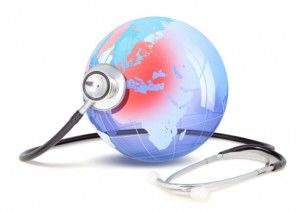You are all prepared for your overseas trip: You have packed the appropriate type of clothing, you have your electric voltage converters, and you have a phrasebook in the native language of the place you are visiting. One thing that you must consider before you go, however, is what you will do if you should become injured or sick while on vacation. It is estimated that nearly a quarter of travelers will become ill or get hurt while on a two-week vacation, so this is not outside the realm of possibility. Here’s what you need to know in order to stay safe and feel prepared should this situation occur:
-
-
Come prepared. Most of the time, illnesses and injuries are minor enough for you to treat yourself. Bring along a first aid kit with common medications, such as Tylenol or Motrin for a fever or minor injury, an anti-diarrheal medication, cortisone and antibiotic cream for any small cuts or bug bites, Benadryl for an allergic reaction, and a cough and cold medicine in case you catch a cold or the flu while on the airplane. Many times, these products will be enough to keep your symptoms under control until you get home. If you take prescription medications, bring copies of your prescription with you. Ask your doctor to indicate the generic form of the medication, as many medications are known by different brand names in other areas of the world.
-
Locate a medical center affiliated with a university, if possible. Many times and in many areas, these hospitals and medical centers will have English-speaking doctors and nurses. If you were to have a non-life threatening emergency, opting for this type of medical center will likely save you the time that might otherwise be spent finding an interpreter once you get there.
-
In case of dire emergency, just go to the nearest hospital or clinic. Heart attacks, gushing lacerations and head injuries are treated all over the world, and a language barrier really won’t matter too much. If you are staying in a hotel, ask the staff to call an ambulance or a taxi; the locals will know the fastest way to get you where you need to be for life-saving treatment.
-
If you need medication from a doctor in your destination country, ask for the generic name of the medicine. This is particularly important if you are allergic to any medications, as you can call your doctor at home to find out whether you might have a problem taking the new prescription. Also, if you need to continue the medicine once you get home, you can show your doctor what you have already been taking.
- Be sure to have travel health insurance if your own health insurance company won’t cover you while you’re gone. Call a week or two before your departure date to find out if your regular health insurance will pay for any medical costs incurred overseas. If not, ask your travel agent for a recommendation for a travel insurance company. If you are going to an area where you do not know anyone, particularly if you do not speak the language, consider purchasing a plan that includes assistance; this way, you’ll have someone to call to help you find a non-emergency provider should the need arise.
-
For the majority of travelers, finding medical care is not anything that they need to worry about while they’re on their vacation. Instead of hoping for the best, however, it’s prudent to be prepared for the worst case scenario. Having a plan will allow you to relax and enjoy your vacation.








